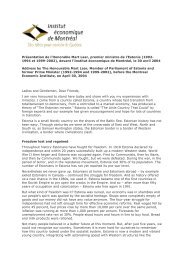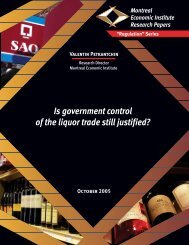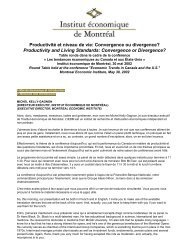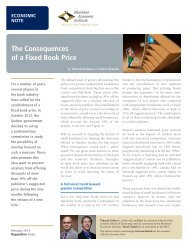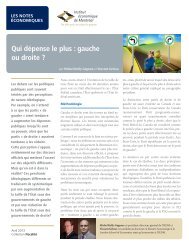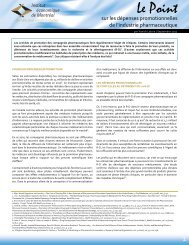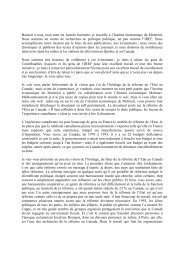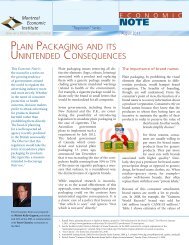Publication (PDF format) - Institut économique de Montréal
Publication (PDF format) - Institut économique de Montréal
Publication (PDF format) - Institut économique de Montréal
You also want an ePaper? Increase the reach of your titles
YUMPU automatically turns print PDFs into web optimized ePapers that Google loves.
Why New International Taxes for Development Are InefficientExecutive SummaryDeveloped since the early2000s, innovative financing for<strong>de</strong>velopment, or IFD, is a collectionof disparate spending projects, organizationsand financing mechanismsin the field of <strong>de</strong>velopmentassistance. It is first and foremosta set of current or proposed newtaxes. The current IFD taxes arethe airline ticket tax and part ofthe proceeds from pollution allowancesin Germany. Several newIFD taxes have been, and are being,proposed, including financial transaction taxes(FTTs), a carbon tax, a tobacco tax, and new specialdrawing rights (SDRs)—a hid<strong>de</strong>n tax.IFD taxes do not meet the criteria of “good”taxes suggested by the standard or orthodox theoryof public finance: efficiency, low administrativecosts, flexibility, political accountability, andfairness. The airline ticket tax hits relatively elastic<strong>de</strong>mand, which implies a large excess bur<strong>de</strong>n(economic cost). FTTs are probably inefficient,<strong>de</strong>spite the fact that many economists favourthem (for reasons unrelated to IFD objectives).Higher tobacco taxes would likely be inefficient,and raise less revenue than anticipated. New SDRscould generate inflation. Only carbon taxes, to theextent that they correct pollution externalities,could possibly be justified from a standard publicfinanceviewpoint. Many IFD taxes may carryhigh administrative costs, especially a tobacco tax,and probably an FTT and a carbon tax as well. AllIFD taxes have inflexible rates, except perhaps forthe hid<strong>de</strong>n tax represented by SDRs. IFD taxesalso fare badly against the criterion of politicalaccountability: They are hid<strong>de</strong>n, and the linkbetween the taxes and what they finance is brokenor obscure.Market failures exist, but so do governmentfailures. Analyzing IFD taxes using this approach—called “Public Choice”—reveals further problems.The danger is that these taxes willserve more for tax exploitationthan for providing the public servicesthat taxpayers want. New taxescreate new rent-seeking opportunities.Rent-seeking also occurswithin governments, on the partof bureaucrats who, like everybodyelse, naturally pursue their own interests.It comes as no surprise thatbureaucrats in <strong>de</strong>velopment agencieshave attractive working conditionsand perks. Most IFD taxes(the proposed tobacco tax being the only possibleexception) levy small amounts of money from alarge number of people who will, therefore, notbe motivated to protest, while the immediate recipientsare a small number of bureaucrats in nationalor international bureaucracies. The incentivesof politicians are misaligned too. The fact thatIFD taxes are hid<strong>de</strong>n and non-transparent is afeature of such taxes, not a bug. International aidagencies are also particularly opaque, and theirauditing procedures often questionable. IFD taxesappear to be more a <strong>de</strong>monstration of governmentfailure than an efficient way to raise moneyto correct market failures.IFD taxes do not, and would not, increase<strong>de</strong>velopment resources as much as it appears theymight at first glance. Money is fungible and asubsidy can just replace other money that wouldhave otherwise been spent on the same things.On top of this, there is much empirical evi<strong>de</strong>ncethat <strong>de</strong>velopment aid has not served to furtherreal and sustainable growth. The importance ofgood institutions, including economic freedomand free international tra<strong>de</strong>, was obscured, if notcountered, by <strong>de</strong>velopment aid.IFD taxes are in many ways the epitome ofinefficient <strong>de</strong>velopment aid.Montreal Economic <strong>Institut</strong>e 5



